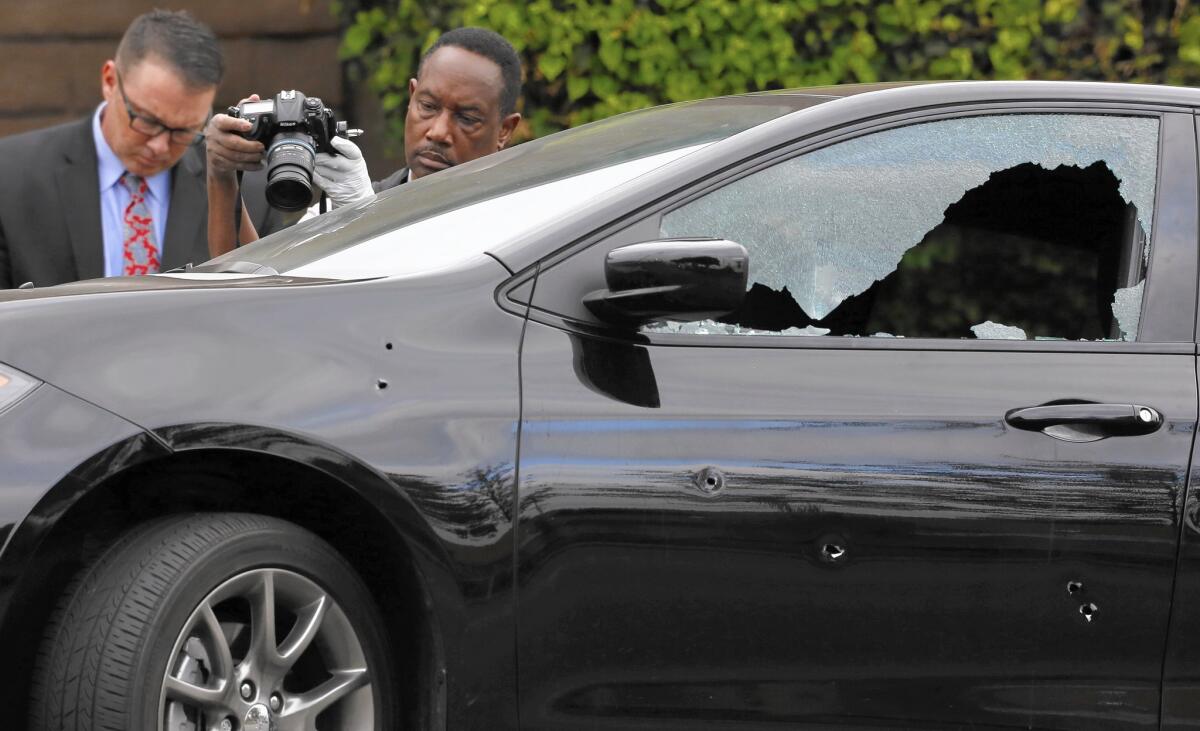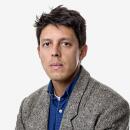Garcetti and Beck say city is working to halt rise in homicides

- Share via
Sara Soltero was getting ready to make some chuletas — stewed pork chops — when she heard gunshots.
She ducked in the kitchen of her South Los Angeles home, then headed outside.
An SUV had crashed into a nearby house and erupted in flames, sending smoke high into Soltero’s South Park neighborhood. Two officers had already pulled the driver out of the vehicle. He had been fatally shot by a gunman before the crash.
“This came out of nowhere,” Soltero, 42, said Friday, standing in front of her home. “I’ve never experienced anything like that.”
The killing on Thursday afternoon added to Los Angeles’ mounting tally after an August that saw 39 homicides, marking the city’s deadliest month in more than five years. So far, at least three people have been killed in September.
Although the killings are well below the numbers experienced in the city’s peak years of the early 1990s, the recent rise in violence has caused alarm, particularly in South Los Angeles, where most of last month’s homicides took place. Police say the upward trend has been fueled by a rise in gang violence, which is up by more than 15% this year.
On Friday, Mayor Eric Garcetti and LAPD Chief Charlie Beck emphasized during a news conference that the city was aggressively trying to quell the violence.
Beck told reporters that the department’s South Bureau had set up a command post that is staffed 20 hours a day and overseen by a captain or higher-ranking officer to coordinate the response. Officers, he said, are meeting with gang intervention workers, clergy and other community groups.
“They are firing on all cylinders to reduce the problem,” Beck said.
Garcetti said more highly trained officers are being deployed in the hardest-hit areas. He said the city’s gang intervention program will be expanding to cover more areas where gangs are prevalent.
“Those are folks who can actually go to the shot callers and say, ‘Hey, can we put gang truces out there, can we look at what’s happening and make sure that whatever retribution is going back and forth, we stop it in its tracks?’ ” he said.
Beck and Garcetti’s news conference — held to discuss the rollout earlier this week of the LAPD’s body cameras for officers — came hours after three people were shot while sitting in a car in the Green Meadows area of South Los Angeles. A 27-year-old man was killed and two other people were injured, police said.
Community activists on Friday called on Garcetti to hold an emergency summit in South Los Angeles that would bring together civil rights leaders, residents, gang intervention workers and gang members in an effort to curtail the surge in homicides. As of Saturday, 185 people had been killed in the city this year — a nearly 7% rise compared with the same period in 2014, according to LAPD data.
The activist groups, which include the Los Angeles Urban Policy Roundtable and Project Islamic Hope, want to see the mayor’s office and the city provide more job resources, after-school programs and other outreach activities in the most violent areas rather than focusing on adding more police, said Najee Ali, president of Project Islamic Hope.
Ali said the mayor’s efforts to send in more intervention workers and assemble a clergy task force were a good first step, but more is needed.
“The quickest way to stop a bullet is with a job,” Ali said. “How about working with city officials to put more jobs in South L.A. for young people?”
On Friday, police identified the man who crashed after being shot as Leon Simpson, 39.
Cameron Buffington, a friend of Simpson for more than two decades, said he had spoken with Simpson a few hours before his death and that they were planning a trip to Lake Elsinore with their families over the Labor Day weekend.
“He was a family man — and that was it,” Buffington said.
Buffington, 47, said it’s unclear why someone would have targeted Simpson, especially because he spoke out against violence and wanted to start a local youth softball team to help give youngsters something to do in the area.
“He was always the first one to be like, ‘Let’s sit down, let’s talk about it,’ ” he said.
Buffington said he believed police have not done enough to combat violence and called for more officers on the streets “not so much harassing people but the appearance of being there.”
Residents in the neighborhood where Simpson was killed said they were shocked by the shooting. Soltero said she would be more careful when she’s out “because this is not normal.”
Her neighbor, Sandra Davis, 61, who has lived in the area for 30 years, agreed.
“When you see flames and you actually see a person there in a car ... it’s a sorrow,” she said.
On the night of the killing, she said, she prayed with one of Simpson’s relatives near a soot-stained chain-link fence and a group of candles. She said the community needs to work with police to stop the killings.
“They need help. We can’t always put everything on the police. It’s about teamwork,” she said.
LAPD Capt. Peter Whittingham, who heads a group of homicide detectives in South Los Angeles, said he has been pleading with local residents to help combat the killings of black men, who make up a disproportionately large number of victims.
“We need, more than anything else, the mothers and fathers of the community to come forward and say, ‘This must stop,’ ” he said.
Twitter: @jpanzar; @nicolesantacruz
Times staff writers Sean Greene and Joseph Serna contributed to this report.
More to Read
Sign up for Essential California
The most important California stories and recommendations in your inbox every morning.
You may occasionally receive promotional content from the Los Angeles Times.











